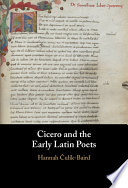

Most ebook files are in PDF format, so you can easily read them using various software such as Foxit Reader or directly on the Google Chrome browser.
Some ebook files are released by publishers in other formats such as .awz, .mobi, .epub, .fb2, etc. You may need to install specific software to read these formats on mobile/PC, such as Calibre.
Please read the tutorial at this link. https://ebooknice.com/page/post?id=faq
We offer FREE conversion to the popular formats you request; however, this may take some time. Therefore, right after payment, please email us, and we will try to provide the service as quickly as possible.
For some exceptional file formats or broken links (if any), please refrain from opening any disputes. Instead, email us first, and we will try to assist within a maximum of 6 hours.
EbookNice Team

Status:
Available5.0
24 reviews The writings of Cicero contain hundreds of quotations of Latin poetry. This book examines his citations of Latin poets writing in diverse poetic genres and demonstrates the importance of poetry as an ethical, historical, and linguistic resource in the late Roman Republic. Hannah Čulík-Baird studies Cicero's use of poetry in his letters, speeches, and philosophical works, contextualizing his practice within the broader intellectual trends of contemporary Rome. Cicero's quotations of the 'classic' Latin poets, such as Ennius, Pacuvius, Accius, and Lucilius, are responsible for preserving the most significant fragments of verse from the second century BCE. The book also therefore examines the process of fragmentation in classical antiquity, with particular attention to the relationship between quotation and fragmentation. The Appendices collect perceptible instances of poetic citation (Greek as well as Latin) in the Ciceronian corpus. <div style='font-style: italic; font-weight: 500; margin-top: 16px;'>*Free conversion of into popular formats such as PDF, DOCX, DOC, AZW, EPUB, and MOBI after payment.</div>